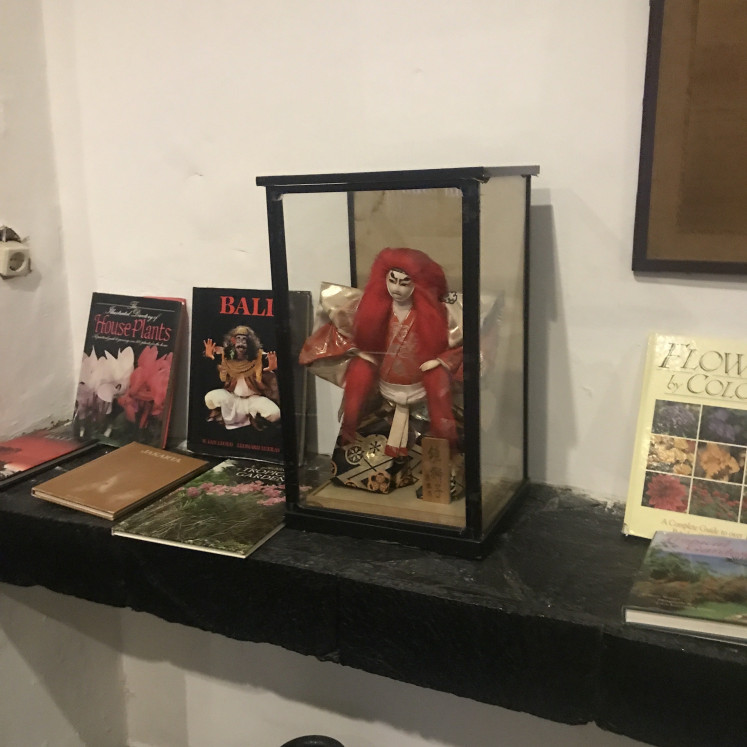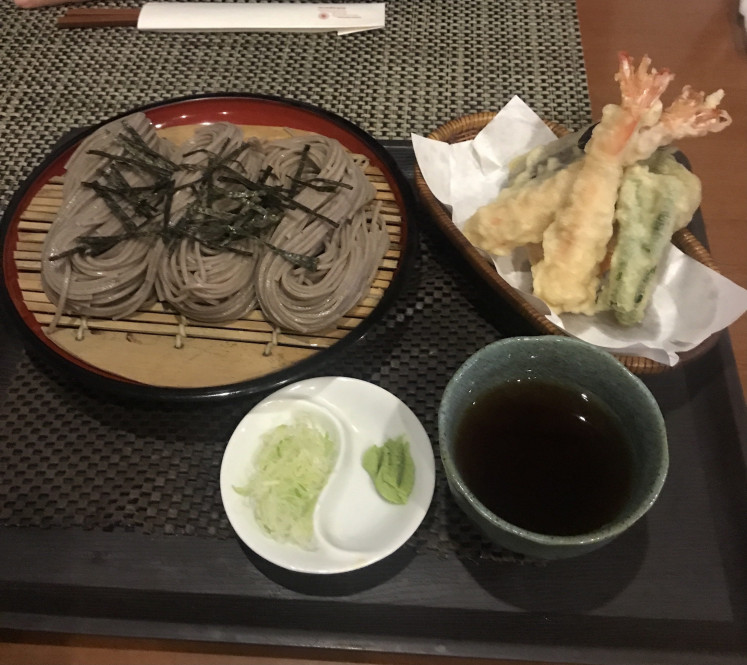Popular Reads
Top Results
Can't find what you're looking for?
View all search resultsPopular Reads
Top Results
Can't find what you're looking for?
View all search resultsKikugawa: Jakarta’s oldest Japanese restaurant flows with change
Change text size
Gift Premium Articles
to Anyone
O
ffering an oasis of calm at the heart of frenetic Jakarta, Kikugawa has surpassed and continues to ride out a variety of challenges as it sustains its memorable renown as the first Japanese restaurant in the capital.
Kikugawa Japanese Restaurant has been the go-to place for peace, quiet and no-nonsense Japanese dishes like sushi, sashimi and tempura since it opened more than 50 years ago.
Located in Cikini subdistrict, Central Jakarta, the eatery’s unassuming façade evokes the timeless atmosphere of a Japanese inn, an effect that is enhanced by the sound of a shamisen, antique porcelain dolls and decorative fans.
Historical beginnings
Kikugawa’s tranquility belies the chaos of World War Two, which brought its founder Terutake Kikuchi to Indonesia.
“Kikuchi came to Indonesia in 1942 as a soldier in the Japanese army, after Japan invaded and occupied [the former Dutch East Indies] in 1942. He met his future wife Amelia Paat in Bandung during his tour of duty in Indonesia,” said Kikugawa general manager Yoanita D. Cahyo.
“In the years between the end of the war [in 1945] until the couple founded Kikugawa in 1969, they returned to Japan. Kikuchi opened an Indonesian restaurant named Bengawan Solo in 1957, while Amelia worked as a local staffer at the Indonesian embassy in Tokyo,” she continued.
Yoanita added that Kikuchi named his Indonesian restaurant after the longest river in Java as well as the eponymous song by Indonesian singer Gesang, aiming to “bring the taste of Indonesia and its culture in Japan”.
Kikugawa, on the other hand, is formed of two characters meaning “chrysanthemum” (kiku) and “river” (kawa), the former taken from its founder’s family name, while the latter is a nod to the namesake river of Kikuchi’s Indonesian restaurant.
While Bengawan Solo closed in 2002, Kikugawa has endured, even after Kikuchi’s passing in 2011 at the age of 93. Amelia took over the helm until her death in 2017, also at the age of 93.
The iconic restaurant is now run by the couple’s youngest son, Tommy, who has maintained its classic, authentic menu, foregoing current trends like slathering mentai mayonnaise on everything.
Cultural exchange: A Kabuki porcelain doll takes center stage on the display shelf in the main dining area at Kikugawa in Menteng, Central Jakarta, the capital’s first and oldest Japanese restaurant. (JP/Tunggul Wirajuda) (JP/Tunggul Wirajuda)Adapting to change
Kikuchi’s culinary approach is epitomized in the signature Ume Set of salmon sushi and salmon sashimi, tempura, sukiyaki and yakitori, with a bowl of miso soup.
Both the salmon sushi and sashimi were fresh and cool, while the sirloin beef sukiyaki was a little tough, but tasty, and the tofu and vegetables in the flavorful broth made up for this. The yakitori was succulent and the tempura did a solid job in bringing the set together, as the batter did not overwhelm the individual flavors of the fresh shrimp, sweet potatoes and beans, though it was not exactly a standout.
According to Yoanita, the set menus have been adapted to match customer preferences.
“[The set menus], including our Sushi Moriawase Set, used to consist of salmon, tuna and squid, but now they are all salmon. Salmon is most preferred by Jakarta diners, while most Indonesians outside Jakarta and Japanese diners prefer tuna, which is traditionally the premier fish for sushi,” she said.
The Tenzaru Soba, on the other hand, is a slightly unusual dish that might turn some diners’ preconception about noodles on its head.
“Zaru is a Japanese [word] that means strainer, and some [soba dishes] are served with ice and other ingredients to keep the soba noodles cold. Tenzaru Soba is rarely served in Japanese restaurants in Jakarta, because many Indonesians have a preconception that noodles should be served hot or warm, and not cold,” Yoanita explained.
It turns out, there is nothing strange or jolting about eating cold, refreshing buckwheat noodles balanced by wholesome tempura. Fresh watermelon slices ended the meal on a high note, with the fruit rounding out the sets.
That the current menu doesn’t offer fresh tuna and other ingredients like cured mackerel favored by Japanese diners reflects a shift in Kikugawa’s customer base.
“Kikugawa used to have a substantial Japanese clientele, among them diplomats from the Japanese embassy and academics, particularly when it was still Jakarta’s only Japanese restaurant. Now they are mostly Indonesian, many of whom are office workers on the go,” Yoanita noted.
“The change extends to their eating habits. While our [menu] used to consist of multiple sets amounting to a four-course dinner, nowadays they are reduced to a single tray in reflection of [our customers’] need for a quick, filling meal,” she added.
Contrast dish: Kikugawa's Tenzaru Soba serves up cool buckwheat noodles alongside a selection of deep-fried tempura and dipping sauce. (JP/Tunggul Wirajuda) (JP/Tunggul Wirajuda)Online popularity
Kikugawa has certainly seen its share of distinguished clientele through the years, including Japanese-born former first lady Dewi Soekarno and Jakarta governors, among them the late Ali Sadikin.
It also had built up a steady number of regulars, but this is also changing.
Yoanita pointed out that its older regulars were giving way to “youths and influencers drawn to Kikugawa by its out-of-the-way locale and quaint setting, which they feel is right for their social media feeds, particularly on Instagram and TikTok”.
“I even had no idea how popular Kikugawa was until someone showed me how many times the restaurant appeared on TikTok,” she added.
And while Yoanita appreciated the greater attention and revenue influencers were bringing to Kikugawa, she also lamented some aspects of the change in diners.
“Kikugawa is usually a place where families and people seek an out-of-the-way eatery where they can savor good food and conversation in a calm setting. But the influencers and those that come in their wake have brought more noise [...], making it similar to an izakaya, or Japanese tavern,” she said.
But Kikugawa regular Meizar Abdullah said the changes did not bother him.
“Aside from social media, Kikugawa’s appeal among young people is perhaps a by-product of the increasing profile of Japanese studies [at local universities], which has increased from five to ten universities in the Jakarta area alone,” said the university lecturer.
“While Korean studies is making inroads in Indonesia, it does not have the tangible historical values that come from places like Kikugawa,” added Meizar, who recalled conversing with Kikuchi in bygone years.
“The restaurant’s historic value and fresh, traditional homemade Japanese food, which remains unaffected by mentai or other fusion trends, still remain its ultimate draw.”
Kikugawa is still recovering from the impacts of the COVID-19 pandemic on the entire food and hospitality industry, which forced the restaurant to curtail its emphasis on freshness while using on-demand food delivery services to reach clients, according to Yoanita.
She adds that the restaurant is also exploring the possibility of introducing new dishes to the menu, like takoyaki (ball-shaped pancakes filled with chopped octopus) and okonomiyaki (savory pancakes with cabbage and other fillings).
How the capital’s first and oldest Japanese restaurant will fare in the future remains to be seen. But like the river in its name, since Kikugawa has endured Indonesia’s ups and downs for the last five decades, there is every reason to believe that it will continue to flow serenely well into the future.
Kikugawa Restaurant
Jl. Cikini IV No. 13
Menteng, Central Jakarta
Tel: (021)315-0668
Open daily except during Idul Fitri
Lunch 11:30 a.m.-3 p.m. (last order at 2:30 p.m.)
Dinner 5:30 p.m.-10 p.m. (last order at 9:30 p.m.)
Instagram: @kikugawa_jkt
Twitter: @KikugawaJkt













